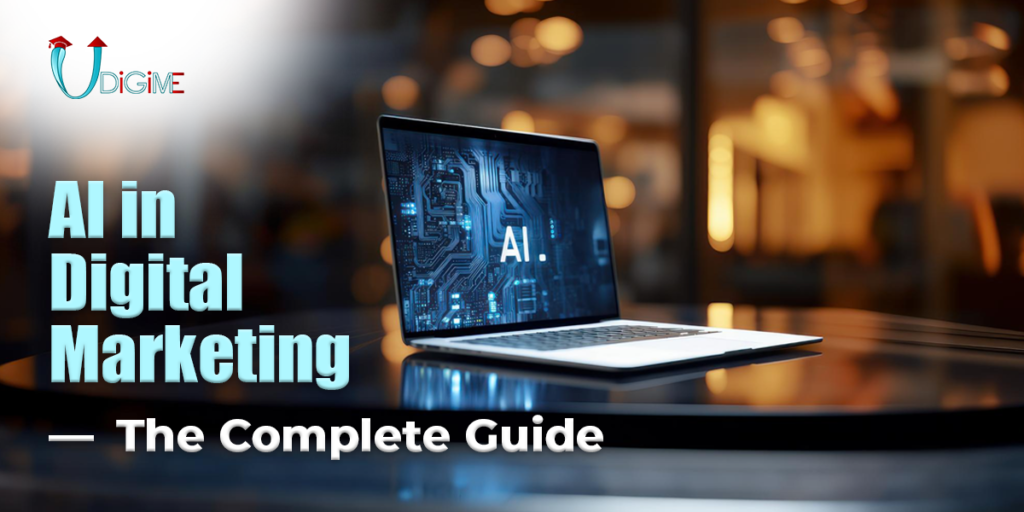Introduction:
In today’s digital landscape, the integration of artificial intelligence (AI) has revolutionized various industries, including digital marketing. As businesses strive to enhance their online presence and engage with their target audiences more effectively, the demand for skilled professionals in digital marketing is on the rise. This comprehensive guide explores the role of AI in digital marketing, its benefits, challenges, and how it’s shaping the future of the industry, offering valuable insights for those seeking opportunities such as an “Internship in digital marketing.“
Understanding AI in Digital Marketing:
Definition of AI in Digital Marketing:
AI in digital marketing refers to the use of advanced algorithms and machine learning techniques to analyze consumer behavior, optimize campaigns, and deliver personalized content across various digital channels.
Key Components of AI in Digital Marketing:
- Data Analysis and Insights: AI algorithms can process large datasets to uncover valuable insights about target audiences, market trends, and competitor strategies.
- Predictive Analytics: By leveraging historical data, AI can predict future trends, customer preferences, and potential outcomes of marketing campaigns.
- Personalization: AI enables marketers to deliver highly targeted and personalized content based on individual user preferences, behavior, and demographics.
- Automation: AI-powered tools automate repetitive tasks such as email marketing, social media scheduling, and ad optimization, freeing up marketers’ time for strategic planning and creative tasks.
Benefits of AI in Digital Marketing:
- Improved Targeting and Segmentation: AI algorithms can analyze consumer data in real-time to identify specific audience segments and tailor marketing messages accordingly, leading to higher conversion rates.
- Enhanced Customer Experience: Personalized recommendations and targeted messaging based on AI insights result in a more engaging and relevant customer experience, fostering loyalty and retention.
- Cost Efficiency: Automation of marketing processes reduces manual labor and minimizes wastage of resources, resulting in cost savings for businesses of all sizes.
- Data-Driven Decision Making: AI-driven analytics provide marketers with actionable insights, enabling them to make informed decisions and optimize campaign performance continuously.
Challenges of Implementing AI in Digital Marketing:
- Data Privacy Concerns: Collecting and analyzing vast amounts of consumer data raise privacy concerns, necessitating compliance with regulations such as GDPR and CCPA.
- Integration Complexity: Integrating AI technologies with existing marketing platforms and workflows may require significant time and resources, posing challenges for businesses with limited technical expertise.
- Algorithm Bias: AI algorithms are susceptible to bias based on the data they’re trained on, leading to skewed results and potentially discriminatory outcomes if not properly addressed.
- Human Oversight: While AI automates many marketing tasks, human oversight is still crucial to ensure accuracy, interpret results, and maintain ethical standards in marketing practices.
The Future of AI in Digital Marketing:
As AI continues to advance, its future in digital marketing appears promising, with ongoing developments poised to reshape the industry landscape. One of the most notable areas of growth lies in natural language processing (NLP), enabling AI to comprehend and generate human-like text. This advancement opens doors for more sophisticated chatbots, content generation tools, and sentiment analysis applications, enhancing customer interactions and content creation processes.
Furthermore, image recognition technology powered by AI is gaining traction, allowing marketers to extract valuable insights from visual content shared on social media platforms and websites. This capability not only facilitates better understanding of consumer preferences and behaviors but also enables more targeted advertising and product recommendations based on visual cues.
Voice search optimization is another frontier where AI is making significant strides. With the growing popularity of voice-enabled devices such as smart speakers and virtual assistants, optimizing content for voice search queries has become imperative for marketers. AI algorithms can analyze spoken language patterns and intents, helping businesses tailor their content to match users’ conversational queries and improve search engine visibility.
Additionally, AI-driven predictive analytics is expected to become more sophisticated, empowering marketers to anticipate customer needs and behaviors with greater accuracy. By leveraging predictive models, businesses can optimize marketing strategies, allocate resources effectively, and stay ahead of market trends, thereby gaining a competitive edge in the digital landscape.
Moreover, AI’s role in hyper-personalization is likely to expand further, enabling marketers to deliver highly individualized experiences across multiple touchpoints. From personalized product recommendations to dynamically generated content, AI-powered solutions enable brands to forge deeper connections with their audiences, driving engagement and loyalty.
Conclusion:
In conclusion, AI is revolutionizing digital marketing by enabling marketers to analyze data, personalize experiences, and automate processes at scale. While AI presents numerous benefits for businesses, it also poses challenges that must be addressed to ensure ethical and effective implementation. By understanding the capabilities of AI in digital marketing and staying abreast of technological advancements, businesses can leverage AI to drive growth, enhance customer engagement, and stay ahead in today’s dynamic digital ecosystem.
By integrating AI into their digital marketing strategies, businesses can unlock new opportunities for growth, efficiency, and innovation in the ever-evolving online landscape. Whether you’re a seasoned marketer or exploring internship opportunities in digital marketing, understanding the role of AI is essential for success in today’s competitive marketplace.


